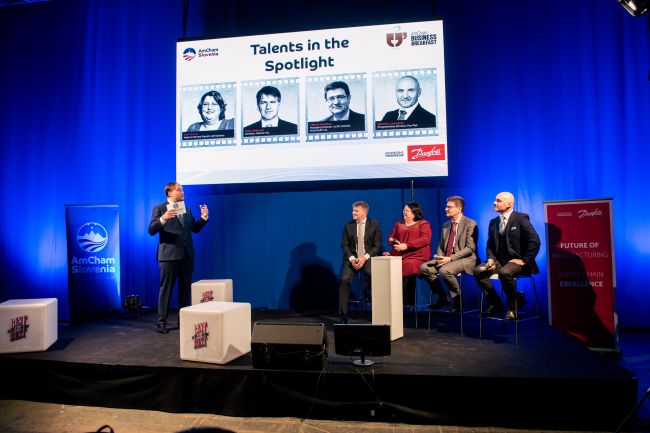In their “Talent Talk”, Dr. Dejan Verčič, Head of the Department of Communication, Faculty of Social Sciences of Ljubljana, partner and Knowledge Director for the Stratkom Communication Group, and Nana Šumrada Slavnič, LL.M., PhD, Deputy VP of Legal Affairs, Ekipa 2 (Outfit7), Leader of the Snowball group 2.0, answered the questions on who are talents in the business world and how the business world understands and speaks the vocabulary of talents.
We must learn to understand the new generation
In his speech, called “Talent Vocabulary in Business”, Dr. Dejan Verčič explained that we have a problem with understanding the younger generation. He explained that in the US the representatives of so-called millennium generation represent the largest workforce, at 35%. They describes themselves as dedicated and hardworking. When their superiors were asked about them, over half disagreed. The problem is a lack of understanding. “When we think about the X and Y generation, we can described them as too confident, with a low attention threshold, lack of self-criticism, and as conformists. However, this was not written today, this was written by Plato 2,000 year ago. He complained when his students began writing and reading, and no longer just memorized his stories,” explained Verčič, adding that the problem older generations have with younger people is that they are not able to control them.

“The problem of the younger generation is us. We have to think about how to understand them, how to work with them, how to learn from them. They know more about the world than us, since we spent half our lives in a fairytale. The young know how to survive in this cruel world, and we have to learn how to open the door for them. The key question is how to use the skills of the future, which the young possess, but we do not,” explained Verčič.
Talent is a sum of knowledge and exceptional characteristics with support in the environment
The second speaker, Nana Šumrada Slavnič, presented the topic of talents in the business world, which is the current subject of Snowball 2.0 under her leadership. She explained that when we speak about talents, we need to speak about three levels: the individual, the company, and the society. In the past, it was very easy to define who is a talent; today, it is much harder. A talented individual has the knowledge and a sum of characteristics that make them exceptional. These characteristics are individuality, charisma, flexibility, the ability to change, to assume their role, a feel for working with people, enthusiasm, and the ability to lead and connect people.

“All these are characteristics that an individual labelled as talented needs. However, they also require an encouraging environment in which capabilities can be developed. Company CEOs must know their employees, they have to know what motivates them, they have to know how to keep them and to attract new talents,” said Nana Šumrada Slavnič, adding that companies aware of the importance of talent management will be successful. An important aspect is also the society, which has to encourage talents. “We have to know how to identify and acknowledge success, to reward it, as this represents motivation for all others. Exceptional individuals must be acknowledges, we have to encourage and develop them, as that is the only way for them to utilize all their potentials and talents,” explained the speaker, who is a super talent herself.
Talent quiz: What is talent and how to keep it?
The second part of the AmCham Business Breakfast included a talent quiz. Branko Čakarmiš, Programming Director, Pro Plus, Lea Tkalec, Head of HR and Payroll, Lidl Slovenia, Miro Smrekar, Director, Adecco H.R., and Srđan Krumpak, Managing Director, ALPE-PANON McDonald's DL, answered questions on talents presented by Mart D. Buh, co-founder and CEO, LanguageSitter. Srđan Krumpak answered the question about how their company attracts and retains talents by explaining that his company dedicates a lot of time to this subject, that they are not afraid of the young, and that they give them many opportunities, since no business could survive otherwise. Lea Tkalec said that Lidl Slovenija increased its visibility, started actively communicating about its advantages and values, thus informing its potential employees about the benefits of employment at Lidl. Miro Smrekar said that it is necessary to speak openly about talents and to seek co-workers’ opinions. “Once you start trusting people and letting them speak, a tremendous amount of good can happen,” added Smrekar. Branko Čakarmiš explained that at Pro Plus, they strive above all to create an environment that encourages the best in all people, in all profiles needed in their work.

You can check out the photo gallery on our Facebook page.
The video of the event is also available on our Facebook page.
Sponsor of the AmCham Business Breakfast:
